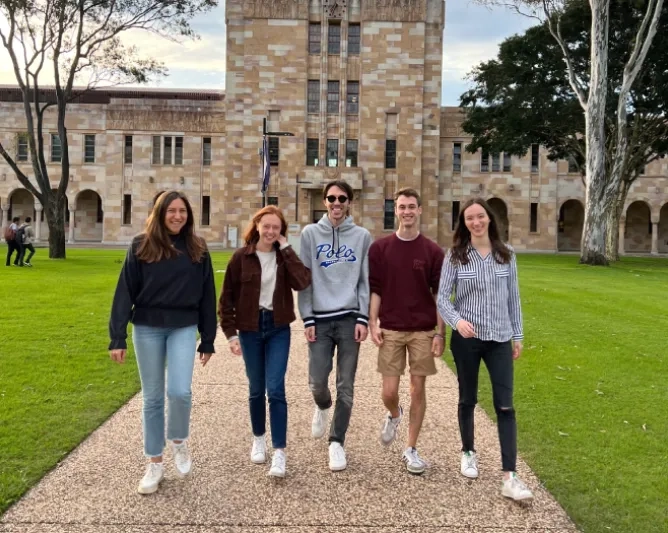Studying abroad
The International Mobility Committee is responsible for evaluating applications for studying abroad.

Studying abroad
Academic mobility
Academic mobility is a compulsory requirement for engineering students since 2011. One of its objectives is to enhance students' ability to be independent and responsible by taking charge of their own mobility project.
The International relations department at Centrale Méditerranée provides support in this process, but it is the students' responsibility to take the initiative in organizing their study program.
There are various options for studying abroad, such as internships, end-of-studies work, a gap year, academic mobility for a semester with the possibility of combining it with a project or internship in a laboratory, and double degree programs.
Selection et procedures
The following information concerns academic mobility during the last two years of the engineering degree (semester 8, semester 9 and/or 10)
1- Choosing an exchange semester abroad
Choosing to study abroad during the 8th semester requires a commitment made in June.
- Students can choose to stay at Centrale Méditerranée ;
- go on an academic exchange abroad with the option to rank up to 3 destination choices (1 destination includes 1 country, 1 university, and 1 field of study) ;
- or participate in an internship in a laboratory.
The placements department manages these internship exchanges.
To apply for studying abroad, students need to complete an online application form via Mobility Online →. They also need to define the learning agreement they wish to follow at the partner university and have it validated by the École's scientific correspondent.
The correspondent will consult the websites of available universities or departments and create a program that allows students to earn at least 30 ECTS credits (or the equivalent for destinations outside Europe), with at least 2/3 of the credits in scientific disciplines. It is recommended to take language courses in the host country if this option is available.
⚠️ Please note
- Assignments to countries and universities will consider the capacity of the partner universities.
- The choice of Semester 8 abroad excludes the choice of a double degree abroad in 3rd year.
- All the courses in the teaching programme defined in advance and approved by Centrale Méditerranée must be validated in the host university. ECTS credits will be awarded for these courses by the Ecole. Courses must be at Master's level.
- It is recommended to have a sufficient level of proficiency in the language of the chosen country to follow the courses, with some exceptions.
E.g. for Scandinavian countries, a good level of English may be sufficient.
- Please note that the semester system does not apply in all countries or universities (e.g. the UK).
- Semester start dates are not the same everywhere, so it is advisable to find out as much as possible so as not to interfere with the École Centrale calendar.
- Some universities charge tuition fees. (Australia, United Kingdom, United States).
- Budget: financial aid is not awarded automatically. The amounts awarded are not sufficient to finance the entire stay. Find out about the cost of living in the host country.
2- Choosing a mobility programme starting in S9-10 (Double degree)
If you choose to follow a double degree in a partner university during your 3rd year at Centrale Méditerranée, your application will be examined at the end of October by the International Mobility Commission. A second committee meeting is held in February.
The number of departures authorised under this scheme is limited to 30% of the intake. Selection is based on the following criteria:
- Academic results in semester 5 and semester 6.
- Destination: priority will be given to certain countries (or certain universities).
- The type of mobility: priority will be given to double degree courses in a Centrale Méditerranée partner university.
- The personal file: the project and its relevance to the course applied for, motivation, language level, the existence of a similar course at Centrale Méditerranée.
Therefore, it is crucial to carefully consider your mobility project. This can be done by conducting thorough research on the websites of partner universities, scheduling meetings with your advisor and engaging in conversations with teachers, language teachers, scientific correspondents, and geographical correspondents.
It is also beneficial to seek feedback from fellow students who are currently studying abroad or have recently completed their studies. The International Relations website → provides access to the online international mobility application form, where you can make up to three choices.
Once the committee approves one of your choices, it is important to promptly contact the International relations department to initiate the application process at the selected university.
Please keep in mind that while the partner university will grant final acceptance, authorization to study abroad will only be confirmed after a positive decision from the final jury of the common core, which takes place at the end of June of the second year.
3 - Calendar of deadlines
- By June 1st year: Apply for Academic Semester S8, including the choice of country, university, and preparation of the teaching program in collaboration with the scientific and geographical correspondent.
- By July 1st year: Academic Semester 8 Committee - September and October 2A: Submit 'S8' applications to foreign universities.
- September 2nd year: Online application for selection by the International Mobility Committee for Double Degree programs.
- October 2nd year: Double Degree Commission publishes the list of students authorized by the International Mobility Commission to begin the application process at a foreign university.
- February 2nd year: 2nd Double Degree Commission.
- June 2nd year: Final acceptance of departures for Double Diploma after the meeting of the Common Core Final Jury (end of 2nd year).
Contact us

International relations
International relations department